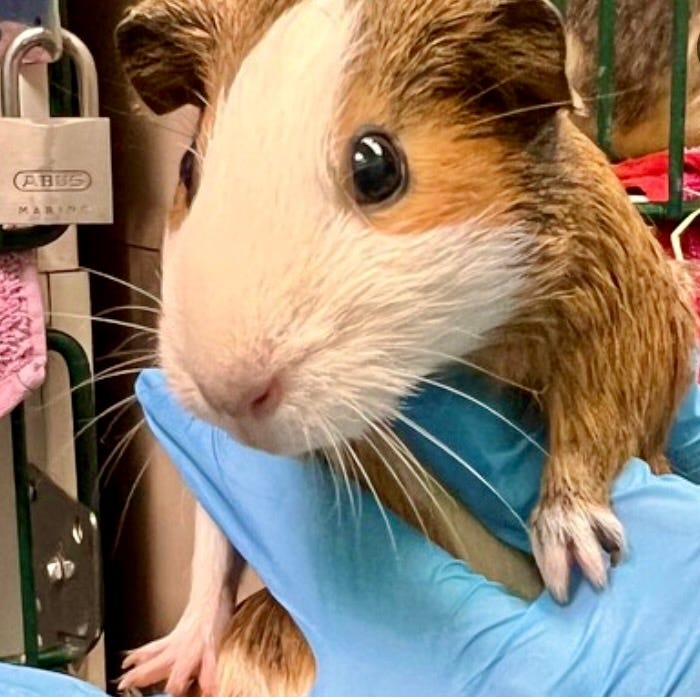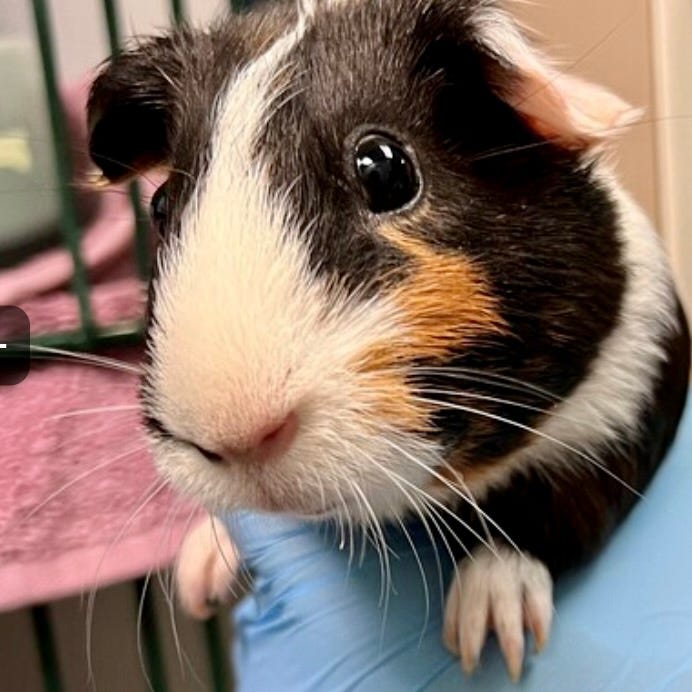NYC Guinea Pig Explosion!
Plus! Eric Adams Watch!! Bagel Questions Answered!!!
Hello everyone,
Welcome to Issue #55 of CAFÉ ANNE!
Last week’s feature looking at two Staten Island bagel shops that have been operating next door to each other for 14 years generated a record number of comments for this newsletter—more than 100!—and perhaps raised more questions than it answered.
Reader Holly R. in Missisipi (who also writes the delightful Release and Gather newsletter), wanted to know what Muhammad Qureshi, owner of Oakwood Bagels, had to say about his rival’s accusation that his bagels go stale in just a couple of hours.
Good question, and one I should have addressed in the original story, just to be fair. I emailed this query to Mr. Qureshi, and this is his response:
“My bagels stay softer for longer. Then again it all depends on how it’s been made. If the dough is fresh bagels would get hard quicker. If the dough is a day or two old bagels can stay soft for even 2 days.”
Reader Mark D. in Minnesota, meanwhile, recalled that back in Issue #22, I had profiled Mike Varley and Jessi Highet, “NYC’s Most Bonkers Walkers,” who had walked 26 miles a day for an entire year, sampling and reviewing bagels in all five boroughs. How did they rate the two bagel shops in my feature story?
I took a quick peak at Everything is Everything NYC, the couple’s absurdly comprehensive bagel shop review site. They had given Oakwood’s bagel just 2.5 stars. And they didn’t rate its rival, Guyon Bagels, at all. When I emailed Mr. Varley for more information, he explained that when there were two bagel stores close together, they typically chose just one to represent the neighborhood.
Since Mr. Varley is a bagel expert, I also asked a question prompted by reader JudgeRoyBean: If a bagel is not boiled (as is the case with Oakwood’s bagels), does it even qualify as a bagel?
Mr. Varley’s response:
“Hand rolling is more important than boiling, although water treatment is crucial. In order to mass produce bagels via machine without gumming up the works, you need to use different ingredients which inherently compromise the flavor and texture.
Boiling is for sure step one for classic taste, flavor, etc. and you would never get people off the fact that it's necessary for a quality bagel. That said, there are new innovative practices out there using essentially vapor treatment rather than boiling, which dramatically reduces the wastewater amount, water cost to store, and physical footprint of the equipment. I could see a future where these practices gradually take over until only a few stores are left doing the "classic" style, much in the same way a shop like Park Slope's Bagel Hole represents a smaller, doughier bagel that many remember from their youth.”
Enough about bagels! I am very excited about this week’s issue. We’ve got a new edition of Eric Adams Watch, plus my account of a bizarre city council hearing dedicated to NYC’s proposed guinea pig ban. Please enjoy!
This is the last issue of the year. I’m taking a two-week holiday vacation. CAFÉ ANNE will resume Monday, January 9 with a very special feature, “NYC Bodega Owner Predictions for 2023.” If you want the bodega owner forecast on any specific topic, please email your suggestion to annekadet@yahoo.com and I’ll ask them your question.
Wishing lovely holidays and a happy new year to everyone! Even if you are bad!!
Regards!
Anne
ERIC ADAMS WATCH
On Vegan Stuffing, Rats and Crypto
I continue enjoying the exploits of Eric Adams, whom my friend Aharon refers to as “New York City’s first AI-generated Mayor.” As a profile in Politico put it, “In a city of weird people and weird mayors, Adams is maybe the most idiosyncratic figure to ever hold the office.”
Here, round-up #13 of the mayor’s doings:
November 28: The mayor, a vegan (except when he’s hungry for fish), releases an instructional video, filmed with Gracie Mansion’s executive chef, Andrea Bergquist-Zamir, on how to make vegan stuffing. She repeatedly calls him “sir.” He chops the onions and tells her about the apple pie his mother used to make. “That’s so special,” she says.
December 4: The NY Times reports that the mayor’s official itinerary provided very little information on his four-day tour of Qatar. The mayor responds: “It’s on my dime. When I do my dime, I can do my time and I don’t want to hear anyone whine.”
December 8: The mayor reveals, at a press conference, that he once spent $7,000 of his own money to rid his block of rats: “I’m terrified of rats!”
December 12: Slate investigates how much money the mayor lost by taking his first three paychecks in crypto. The answer: about $10,000. A mayoral spokesperson tells Slate that Mr. Adams is still committed to making NYC a cryptocurrency hub. Meanwhile, NYCCoin, the cryptocurrency introduced with the mayor’s support in February, is down 94%.
December 13: The Mayor posts a video of himself riding the northbound 5 train with a fellow passenger. He has his arm around the man. “I found a partner—tell them what we both hate!’ he says. “Rats!” says the man. The mayor laughs and claps his new pal on the back: “We hate rats!”
December 15: Gothamist reports that since October, Mayor Adams has said the word “rat” at least 80 times in press conferences and interviews, some of which were entirely focused on rodents.
FEATURE
NYC Guinea Pig Explosion!
In my decades as a NYC journalist, I have never not once covered a City Council meeting. Until I learned least week that the Council’s Committee on Health was holding a hearing on the city’s proposed guinea pig ban. How could I miss that?
Reader, it was everything I’d hoped for, and more.
The City Council hearing room is on the second floor of City Hall and it looks very 1852! There are many paintings and carvings of horses and eagles. But no guinea pigs!
I asked the sergeant-at-arms if it was okay to take photos. He asked if I was a reporter—if so, I’d have to sit off to one side, in the press pen.
“I’m a blogger,” I said.
He looked uncertain.
“I’m a silly blogger,” I added.
He let me sit wherever I pleased, and I took a seat in the front row. I turned to the lady behind me and asked what brought her to the hearing. Debra Kalish told me she lives on Manhattan’s Upper West Side and is a volunteer dog walker with NYC’s Animal Control Centers (ACC) —aka the city pound.
“I feel it’s extremely important for us to be protecting guinea pigs as well as other animals in the city,” she said. “The ACC is overwhelmed with surrendered and abandoned guinea pigs. Overrun! Hundreds and hundreds and hundreds! Desperate to find a new home. They were one of the hit pets of the pandemic. People got tired of them and started to return them. They are abandoning them in the parks, in boxes in front of supermarkets—just throwing them out!”
“Wow!” I said.
The bill, she explained, would not bar people from keeping guinea pigs, but would ban stores from selling them. “There’s no reason for there to be more guinea pigs in this city,” she said. “And they should not be sold in pet stores. They need to be fostered and adopted from the shelters.”
I scanned the room. There were about 30 people in the audience, mostly ladies. One, Elena Natale, a volunteer with Voters For Animal Rights, was distributing free “I ❤️ guinea pig” teeshirts, which many in the crowd donned over their dress shirts and sweaters.
The hearing started with a statement from Health Committee Chair Lynn Schulman, the council member from Forest Hills, Queens. She outlined the scope of the guinea pig explosion.
“Around 600 guinea pigs have been surrendered to city animal shelters in 2022, compared to only 281 during the same period in 2019,” she said. “In October, a box of 22 guinea pigs of all ages, five of which were pregnant, was abandoned in the lobby of an apartment building in Staten Island…We cannot allow this crisis to continue and the city must take action!”
The next council member to speak was Diana Ayala, who represents East Harlem and the South Bronx.
“While it would never occur to me to get a guinea pig as a comfort animal—as a pet—a lot of people did,” she said of the pandemic trend. “And that’s a great thing. I have my little Charlie with me!”
She produced a small, wiggly dog, held him up, and pretended to speak in his voice: “See?” she crooned, “I’m attending my first hearing!”
Charlie licked her face.
“We heard so many stories from shelters,” Council Member Ayala continued. “They shared that people were taking the guinea pigs and throwing them over the gates, because they could no longer care for them. And I get it! My mom passed away this year and I was looking for a comfort animal myself. I have three cats, I’m a cat mom, but I felt I needed an animal to comfort me, and keep me sane, but Charlie’s a pain in the butt! He gets up at three or four o’clock in the morning like a regular baby, he wants to be fed. It’s a big responsibility!”
“We have so many animals in the shelter system already,” she continued. “Adopt! Adopt! Charlie is an adopted animal from Puerto Rico. He’s actually legally blind, but he’s the cutest little baby. I want to make sure he’s okay, just like we want to make sure animals like guinea pigs are taken care of, so thank you Chairperson Schulman.”
Next to testify was Risa Weinstock, CEO of the ACC, the city’s animal shelter system. “That’s a tough act to follow,” she said.
The numbers, she said, were even bigger than Council Member Schulman had reported: “So far this year, ACC has taken in over 16,000 animals, including more than 14,000 dogs and cats, and over the same time period, we have received over 750 guinea pigs!”
Guinea pigs are require a lot of care, multiply fast and are difficult to spay and neuter, she went on.
Council Member Schulman listened politely before adding her own testimony: “I had a dog who passed away a few years ago, his name was Elvis and I will say I got him at a pet store but nobody wanted him because he had a crooked tail. We were the only ones who wanted him. At ten years of age we had him trained as a safety dog and he went to hospitals and met with patients and all of that. And right now, I don’t have the time to take care of a dog, but I’m going to get a rescue dog. I’d love to do that.”
Ms. Weinstock nodded appreciatively.
Council Member Schulman had some questions for Ms. Weinstock: “Abandoning animals is illegal. Have there been any investigations into who is responsible for abandoning large numbers of guinea pigs in buildings and parks?”
“If there are clues, NYPD will investigate, but my understanding is that’s rarely the case,” said Ms. Weinstock.
Council Member Schulman asked how much it costs to shelter guinea pigs. Ms. Weinstock said this is difficult to quantify.
“We heard about a $25,000 guinea pig tower,” pressed Council Member Schulman.
“The tower is something we tried to house them,” said Ms. Weinstock. “We’re getting so many, we have to think of ideas and ways to keep them. We don’t have plans to buy another tower.”
Several more city officials testified. The hearing was surprisingly casual. Council members drifted in and out at random. One Brooklyn rep showed up late and asked Ms. Weinstock the same set of questions that Council Member Schulman had already asked. Ms. Weinstock, to her credit, cheerfully repeated her testimony as if for the first time.
We next heard from a panel of officials from various animal welfare organizations.
“It’s not that just stores are selling guinea pigs, it’s that they’re selling guinea pigs unaltered and often with their sex mislabeled,” said Libby Post, executive director of the New York State Animal Protection Federation. “Unsuspecting consumers are bringing home pairs of guinea pigs of the same sex, only to find out sixty days later they purchased a male and female. Guinea pigs can mate every two months!”
There are only a handful of vets in the city, she added, who are willing to neuter guinea pigs.
Next was Dr. Lyle Cleary, a veterinarian with the Center for Avian & Exotic Medicine. “I love my job, but there are two surgeries that make me question my choice of profession, and one is a guinea pig spaying,” he said.
The surgery costs $600 to $800, he continued, and it’s a doozy.
“Is there birth control for guinea pigs?” asked Council Member Schulman.
“We have experimented with an implant—it’s $700 to $800 per pet, and only lasts eight months,” said Dr. Cleary.
“And I know it’s difficult to determine their sex—why is that?” said Council Member Schulman.
Dr. Cleary sighed. “You know, they fool even me sometimes. Before the balls drop on the boys, it’s hard to tell. It’s kind of an art. There’s no external testicles. You don’t really have much of a penis on them. So it’s not like you’re seeing it hang out there.”
“Thank you,” said Council Member Schulman.
During the break, I looked around for other reporters. I was happy to see the only fellow journalists on the scene appeared to be two students from the CUNY Graduate School of Journalism, on assignment for a class. I had an exclusive scoop!
I asked one of the students, Maja Clasen, if she’d ever owned a guinea pig.
“I had them as a kid,” she said. “They were really cute. Now that I think about it, it’s related to this. We got them from a pet store, and got one, and it was pregnant and it had babies, and then we had the four guinea pigs in total. Eventually I developed a severe allergy to guinea pigs so we had to re-home them.”
I told her how when I was little, my sister and I adopted two guinea pigs from our town’s middle school science teacher. We named them Fluffy and Weasel.
“We kept them in a cage on the porch, and one morning we found their body parts all over the yard,” I said. “I guess some animal got into the cage. There was fur everywhere.”
“Oh, that’s so sad,” said Ms. Clasen.
“But then we got some replacement guinea pigs from the science teacher,” I said.
“Oh, that’s funny,” said Ms. Clasen. “Well, it’s sad.”
“Yes,” I said.
I looked around the room. “I hope we hear from some pet store owners,” I said.
“Me too,” she said. “There’s been a real lack of them.”




Alas, when the hearing resumed, we heard from another panel of animal welfare folks, followed by an online panel of animal welfare folks. Having exhausted all the details of the Great NYC Guinea Pig Crisis of 2022, most used their allotted two minutes to testify about the great work they were doing. When the hearing dragged on into a third hour, I decided it was a good time to leave.
But I couldn’t stop wondering: what did the city’s pet store owners have to say? I contacted several local shops that sell guinea pigs, but no one got back to me. Then I tried Googling “Guinea Pig Industry Association.”
Reader, there is no such thing, but my search did take me to the Washington, DC-based Pet Advocacy Network— “The Voice of the Responsible Pet Care Community.”
Sure enough, it had just issued a statement on the proposed guinea pig ban. The explosion was temporary, it said, and a ban would only punish the animals: “It is important that prospective pet owners have pet stores to turn to as the only transparent, regulated and inspected source for guinea pigs.”
They might have a point. You know what happens every time the city bans anything—pretty soon we’ll have smugglers selling untaxed rodents out of car trunks on the Red Hook piers. Which, come to think of it, would make a great story for CAFÉ ANNE.
Want to adopt an abandoned guinea pig from a NYC shelter? The Animal Care Centers of NYC have got you covered.
CAFÉ ANNE is a free weekly newsletter created by Brooklyn journalist Anne Kadet. Subscribe to get the latest issue every Monday!














I like to personally imagine that the $25k Guinea pig tower is designed to look like the Empire State Building and that there’s a Guinea pig doorman, and an elevator operator who takes all the others to their proper floor where their apartment is located.
I think it’s Anne’s journalistic responsibility as a “silly blogger” to find out more about this tower.
Can you find out WHAT IS THE OTHER PROCEDURE that has that vet questioning his life choices?